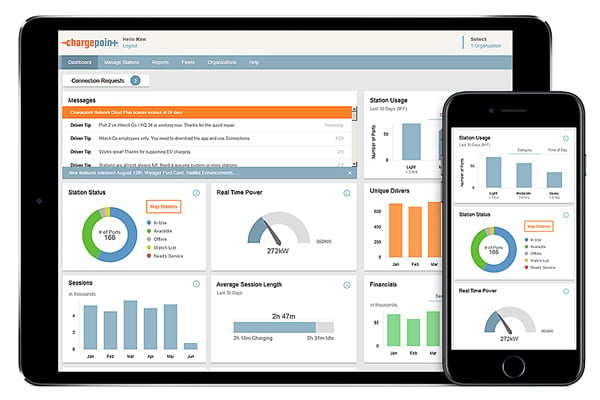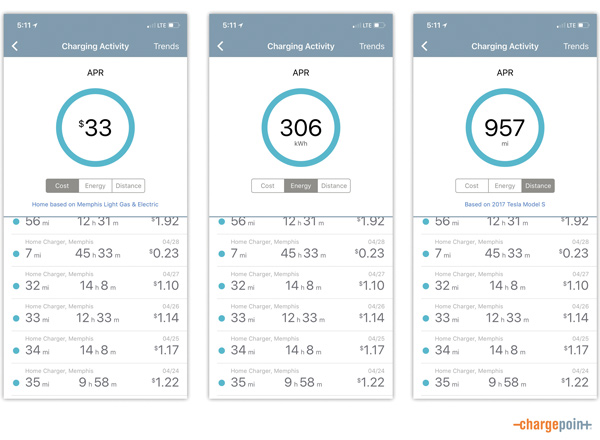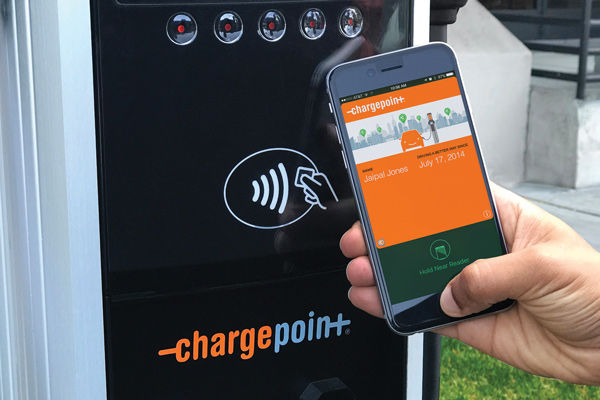Networked Electric Vehicle Charging Stations

The answers to five simple questions reveal the benefits of these systems for businesses.

The ChargePoint dashboard delivers real-time data for property owners.
NETWORKED OR "SMART" charging stations allow all types of properties, including office buildings, shopping centers and multifamily communities, to connect EV charging stations to a network. This system can benefit property owners of all types who want to install more charging spots without installing a new transformer, shopping center or store owners who want to set a fee for charging after people are done shopping, or multifamily communities that need to track residents’ energy use.
Non-networked chargers can be cheaper upfront, but will cost more in the long run when they have to be replaced with upgraded systems. Here are a few key questions to ask to determine whether networked EV charging stations are the smart choice for your property.
Do you want to collect fees for charging and be able to change those fee amounts over time? Networked stations make it easy to manage how much (if anything) it costs for people to charge at stations, and they facilitate changing fee amounts over time. Free charging can help attract customers to a property, while setting a small fee can help recover electricity costs. Adding a fee after an hour or two encourages drivers to move on after they’re done powering up. The right price will vary by location, property type, time of day and other factors. It can be cumbersome or impossible to set and alter charging fees at non-networked stations.

The ChargePoint mobile app allows drivers to keep track of charging activity, energy usage and distance traveled.
Do you want to determine who can charge at your stations? Networked charging makes it easy to limit access to electric chargers to certain groups of EV drivers, and it also enables different groups to power up at different times of day. One could, for example, limit access to employees during work hours and open up charging to the public after hours. With a non-networked station, a host will need to create a process to support access control, such as giving drivers a PIN code or physical key to access the station. If drivers forget the PIN or lose the key, they won’t be able to charge and could associate this frustration with a particular property.
Do you want to see how your stations are doing at a glance? Networked charging solutions often provide a dashboard that property owners and managers can access on their digital devices or desktop computers. This platform enables one to see how many people are charging at a station at any moment. This integrated approach also enables support technicians to perform remote monitoring and troubleshooting, keeping the stations up and running as much as possible. Non-networked stations will require an expensive in-person visit to diagnose and fix issues.

The “tap to charge” feature allows drivers to quickly and easily charge their vehicles using a mobile app.
Do you want to know who’s using your stations? One of the most important advantages of networked charging is the ability to gather and analyze data. Who’s using the stations and when? What types of cars do they drive? How much energy is being consumed? This information is difficult if not impossible to gather from non-networked stations, and it empowers the host to understand the return on investment and assess the need for more chargers.
Do you want to know how much energy you’re using and set limits on energy use? Energy costs don’t need to be a barrier to installing EV charging stations. With a networked EV charging system, the host can monitor real-time energy use and control costs by setting a ceiling to avoid “demand charges” or high power costs billed by utility companies. A networked solution will also provide reports on energy use, costs and emissions avoided to facilitate data sharing.
With the rapid growth of EVs, providing an easy and affordable charging solution could be the amenity that attracts customers to one property over another.
Michael Jones, vice president, North American Strategic Sales, ChargePoint
Unit and Installation Costs for Non-Residential Electric Vehicle Supply Equipment“The cost of a single port EVSE unit ranges from $300 to $1,500 for Level 1, $400 to $6,500 for Level 2, and $10,000 to $40,000 for DC fast charging. Installation costs vary greatly from site to site with a ballpark cost range of $0 to $3,000 for Level 1, $600 to $12,700 for Level 2, and $4,000 to $51,000 for DC fast charging.” Source: “Costs Associated With Non-Residential Electric Vehicle Supply Equipment,” U.S. Department of Energy, 2015 |


